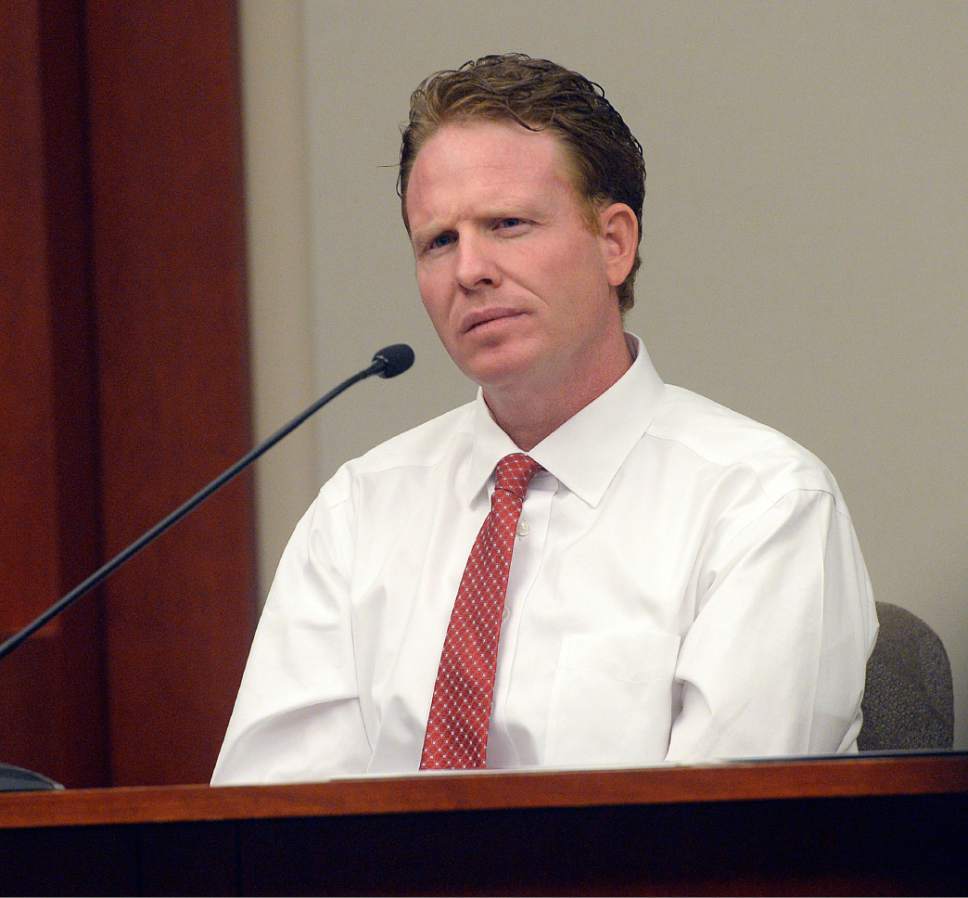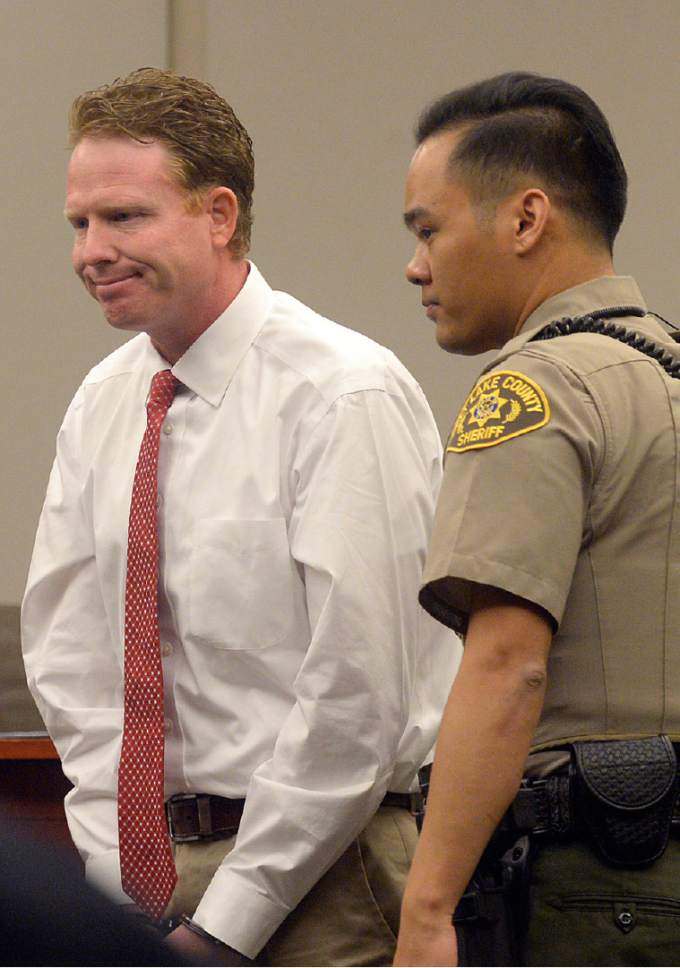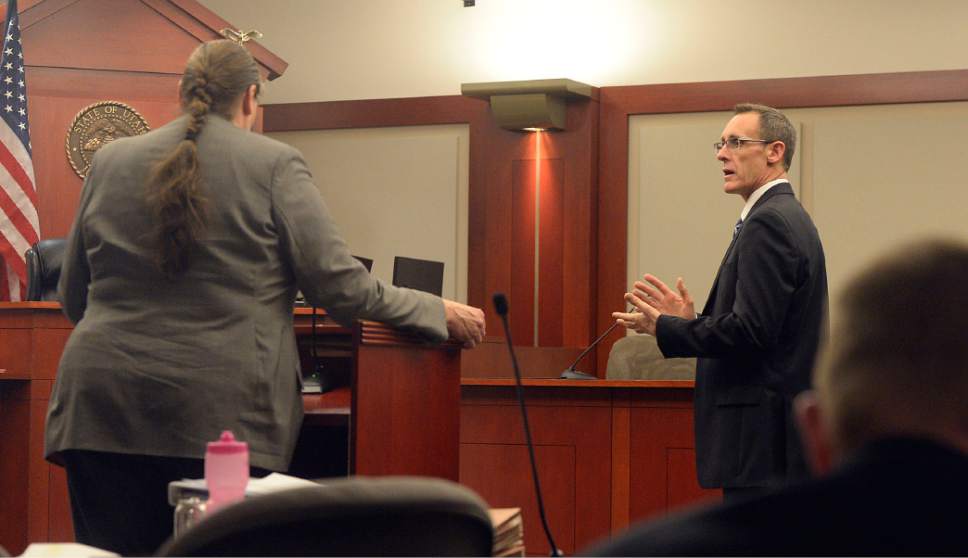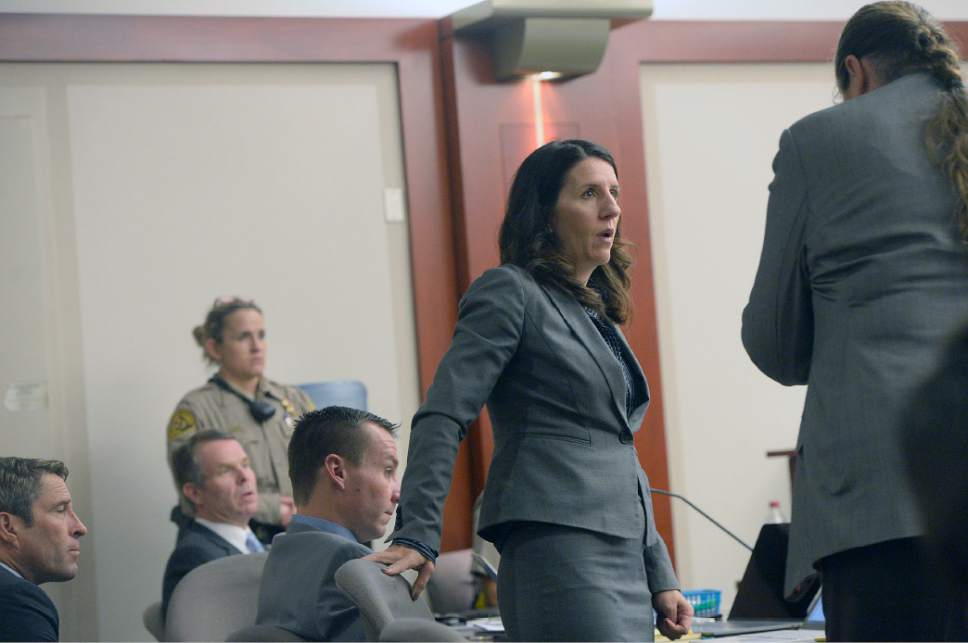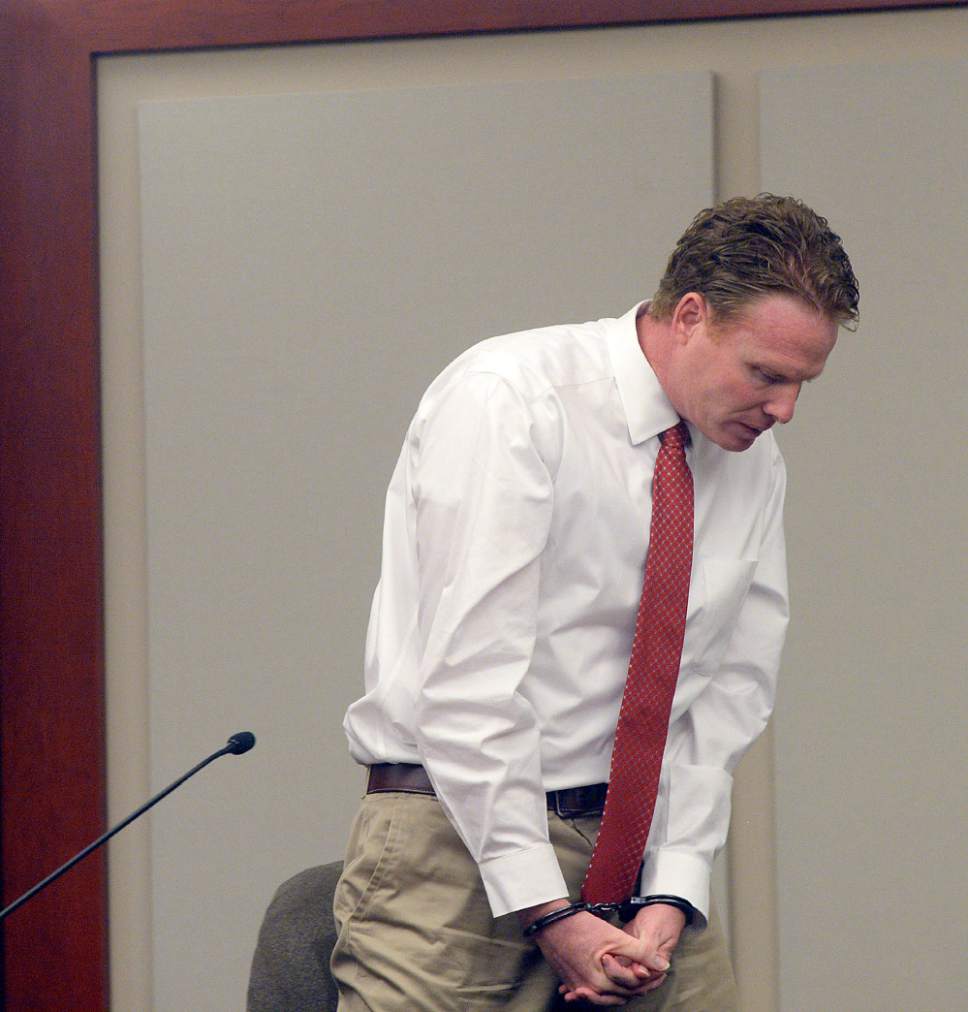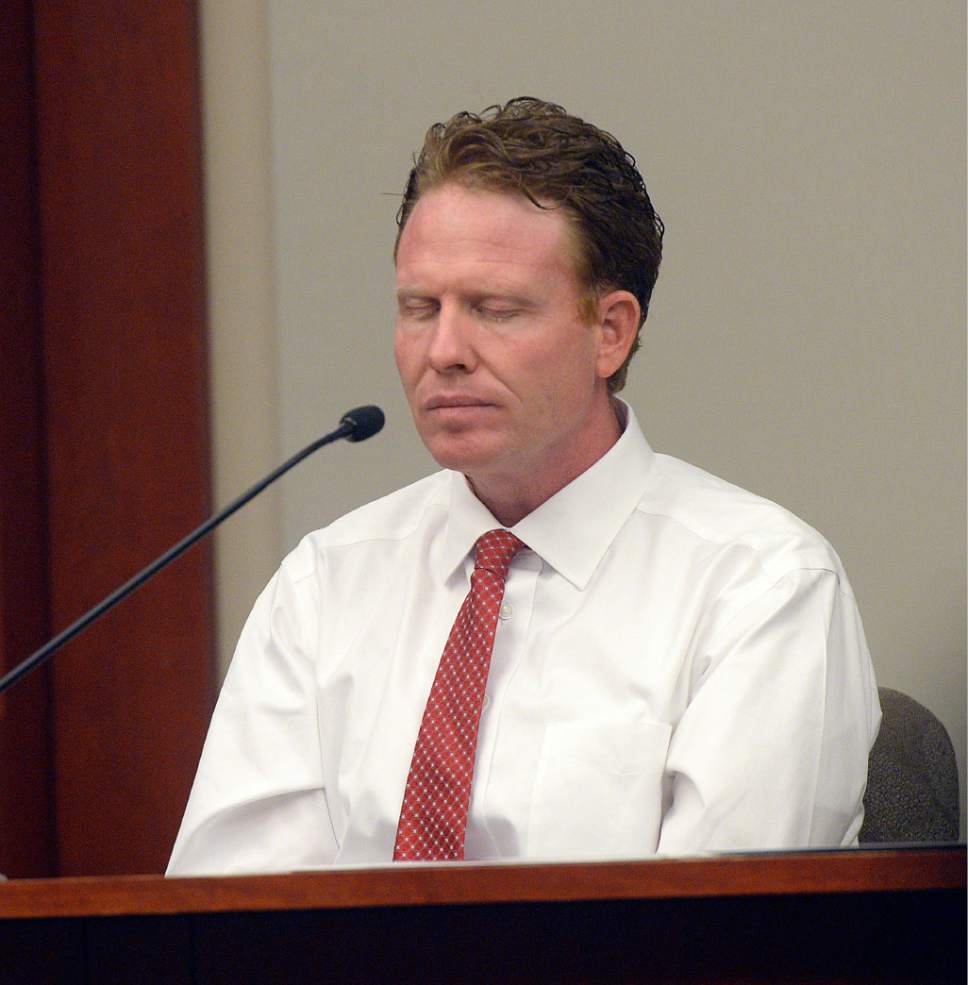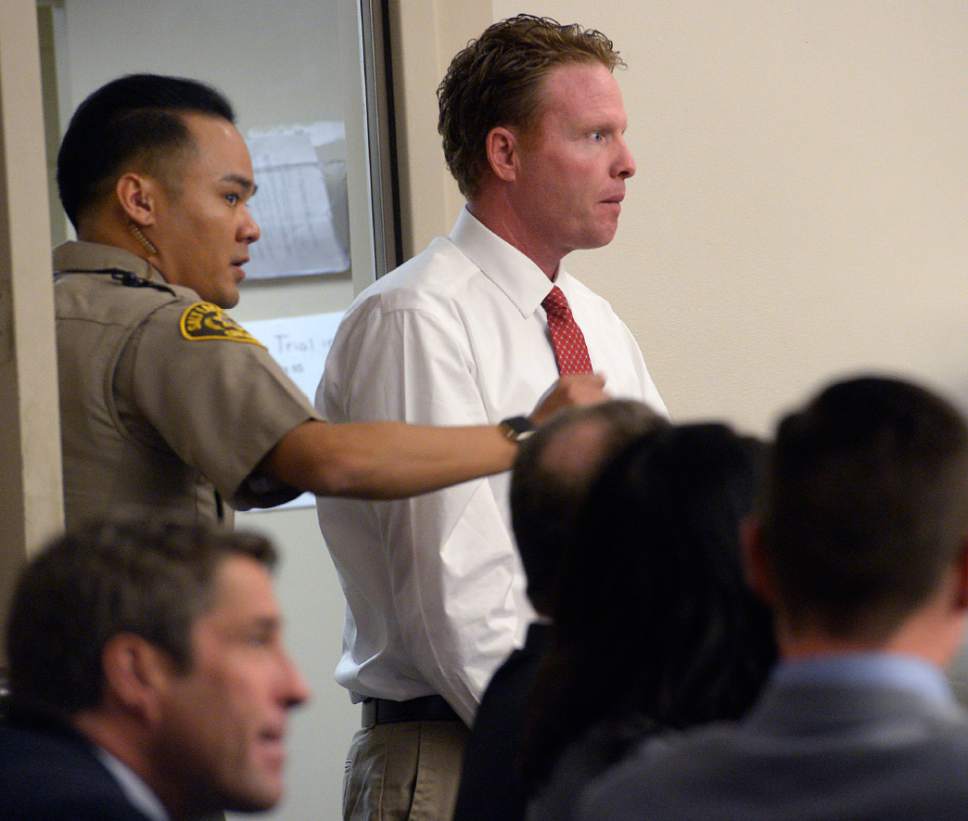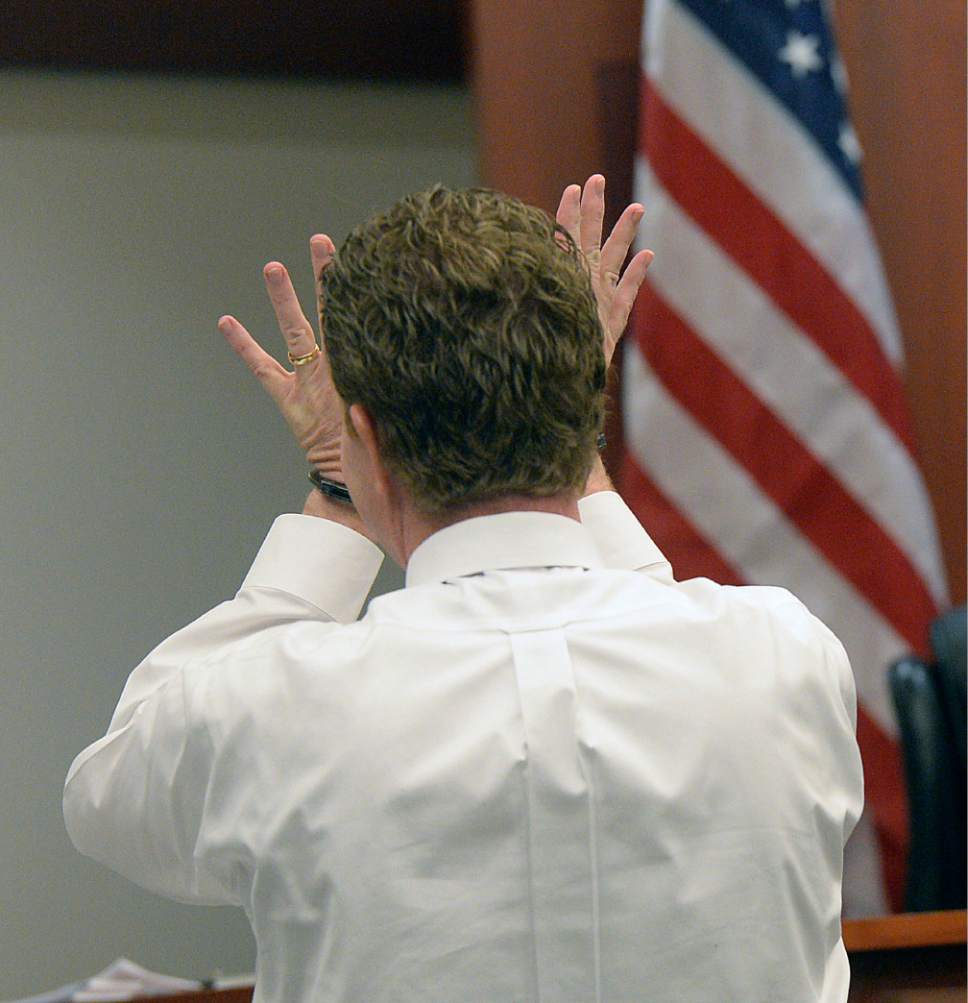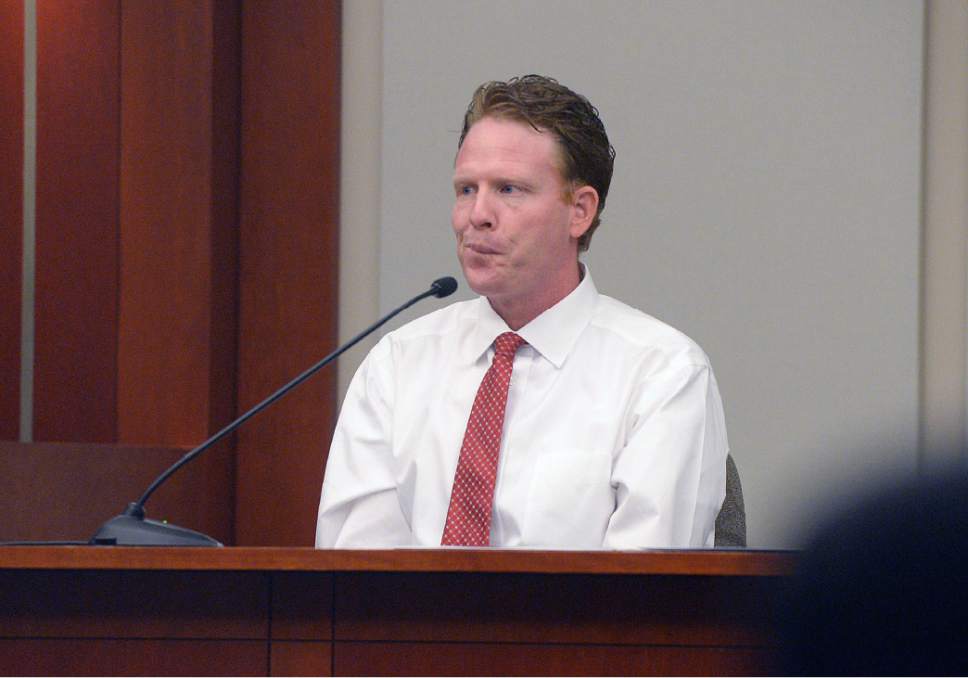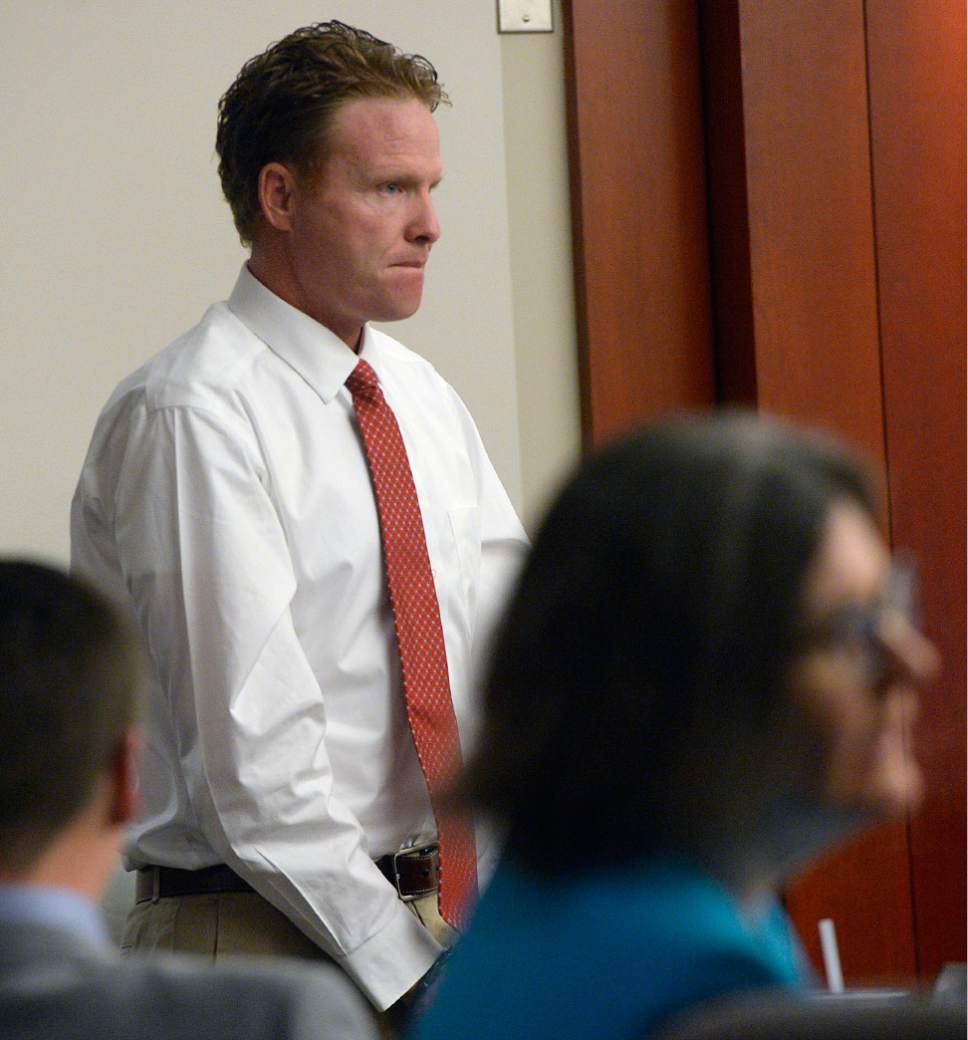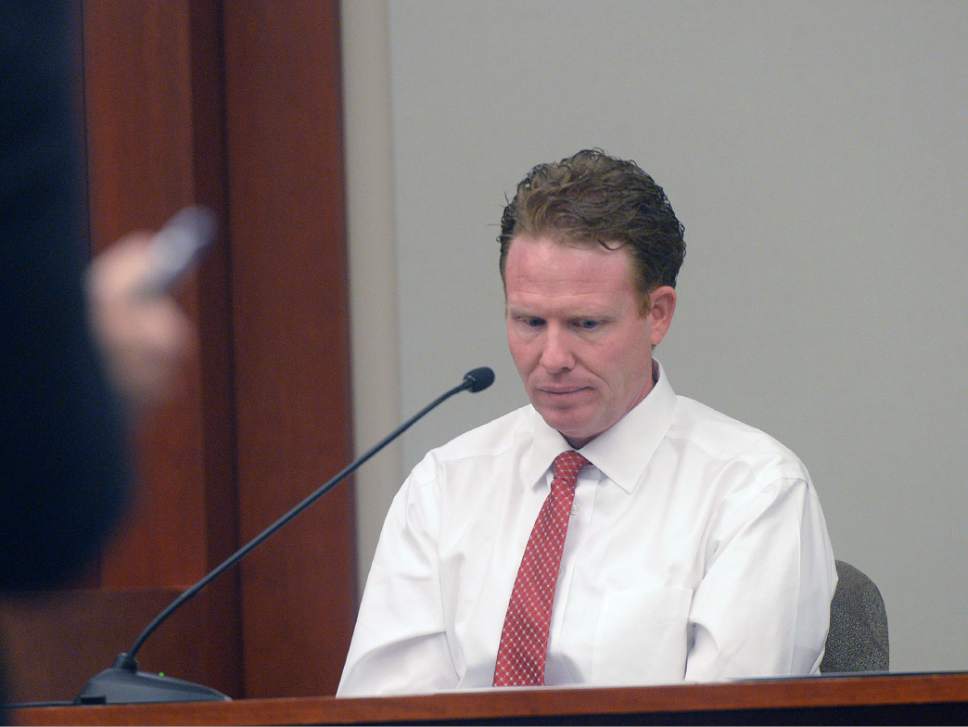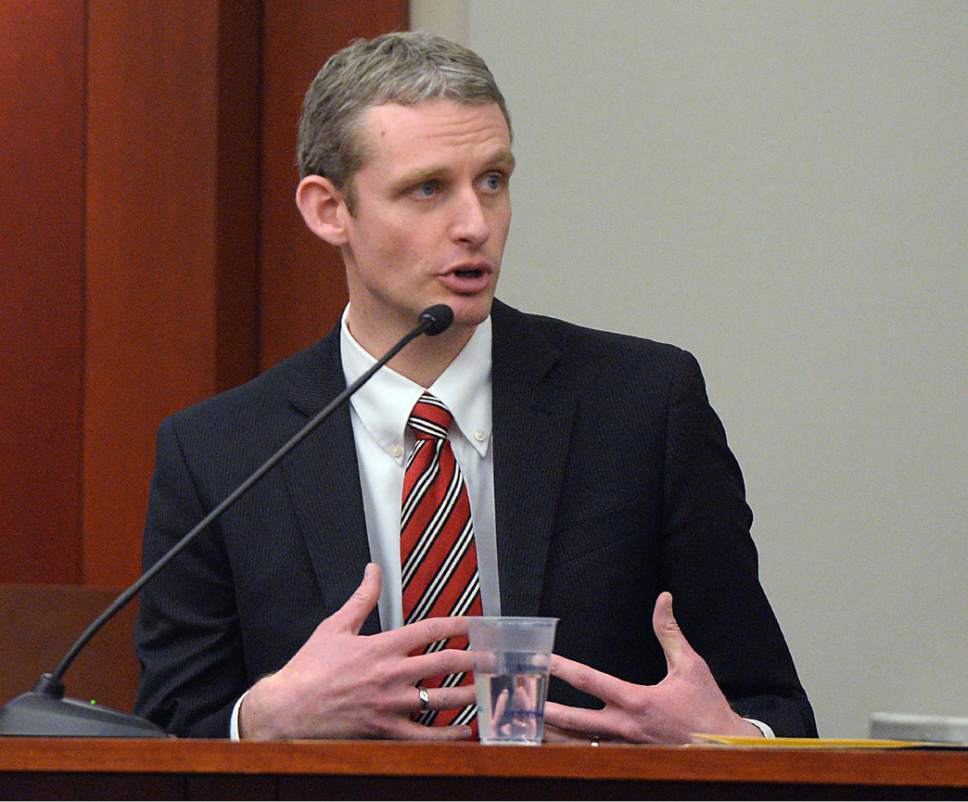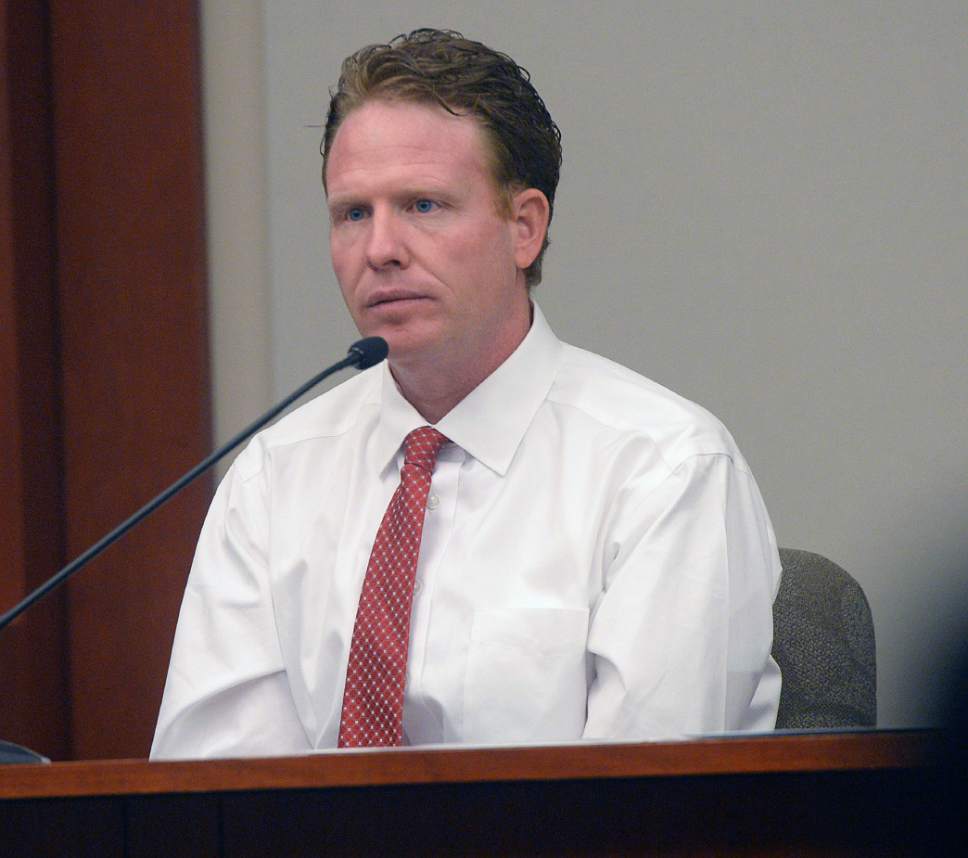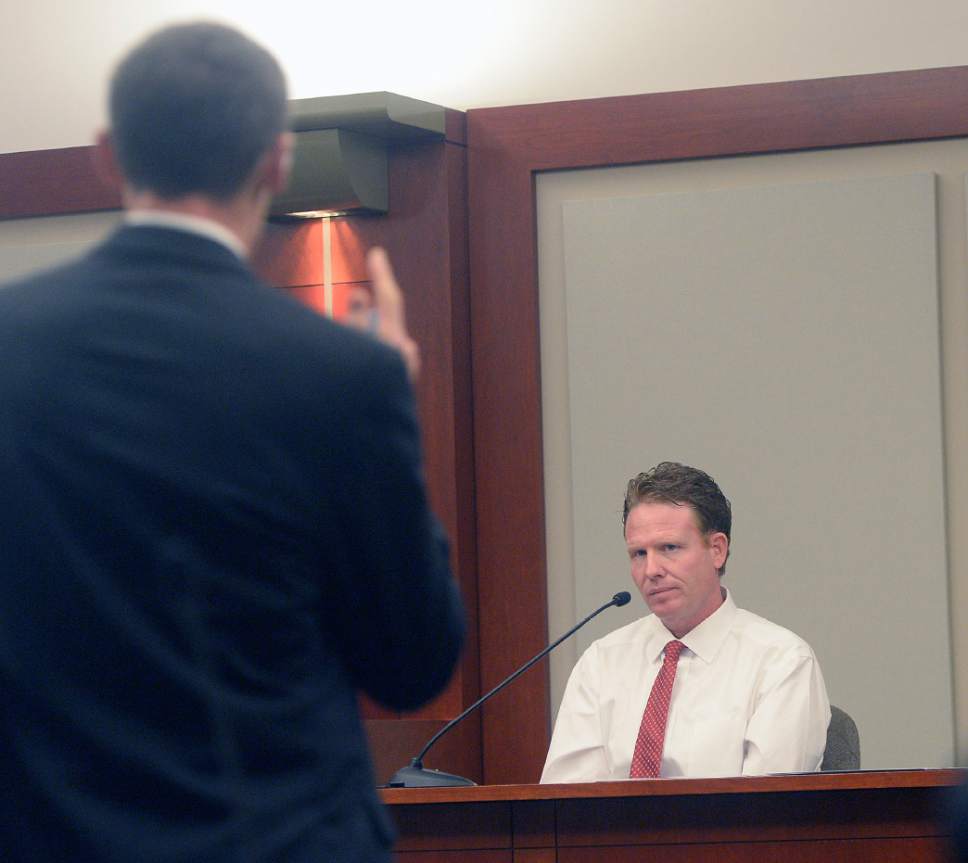This is an archived article that was published on sltrib.com in 2017, and information in the article may be outdated. It is provided only for personal research purposes and may not be reprinted.
The man whose mouth set off the scandal that ensnared John Swallow refused to talk Wednesday and, in doing so, gummed up the prosecution of the former Utah attorney general.
Imprisoned St. George businessman Jeremy Johnson, wearing a white shirt, tie and handcuffs, refused to testify in the public-corruption trial — even after obtaining a promise of immunity.
Third District Judge Elizabeth Hruby-Mills sent Johnson — who is serving an 11-year federal prison sentence and was brought from California to testify — to the Salt Lake County jail for 30 days after prosecutors attempted to question him.
"I understand that it's not in my best interest to answer any questions," Johnson said after Deputy Salt Lake County District Attorney Fred Burmester asked the witness whether he knew he had been offered immunity by the attorney's office.
The judge then ordered Johnson to answer.
"I don't mean to disrespect the court," Johnson responded, with the jury out of the courtroom. "But I can't answer."
Hruby-Mills found Johnson in contempt and ordered him brought back to court again Thursday to see whether he would have a change of heart.
Johnson is a key state witness. Four of the 12 felonies Swallow faces are tied directly to his interactions with Johnson or an intermediary.
Johnson had been called as a prosecution witness because of Swallow's use of Johnson's Lake Powell houseboat, flights on his corporate jet, involvement in an attempt to stall a federal investigation into Johnson's online marketing company and an effort to get the Utah attorney general's office to sign off on the processing of online-poker payments by Johnson and his partners at a now-defunct St. George bank.
Johnson's silence could result in those charges being tossed out. It also could bring a mistrial motion by Swallow's lawyers because of the businessman's importance to the case. He was named in opening remarks as a key prosecution witness.
Before testimony began Wednesday, prosecutors told the court they had learned Tuesday night that Johnson would clam up.
In response, Salt Lake County District Attorney Sim Gill offered Johnson immunity to protect him from prosecution for anything he might say on the stand.
That brought Johnson's lawyers, Mary Corporon and Karra Porter, to court to explain that Johnson was resisting testimony because past promises of immunity had not been honored, particularly by the federal government. Those deals were in relation to the Swallow case and the now-dismissed prosecution of Swallow's immediate predecessor, former three-term Attorney General Mark Shurtleff.
"Mr. Johnson has been here before," said Corporon, adding that those experiences had only bought Johnson more trouble, including a Federal Election Commission lawsuit over political donations funded by Johnson and made through so-called straw donors.
Johnson was convicted in federal court last year on eight charges of providing false information to a bank. At the same time, a jury acquitted him of 78 other charges.
Corporon said Johnson was overcharged and unfairly prosecuted and fears federal authorities could go after him again.
"From our perspective, and everything that has transpired since, that prosecution indicates that the federal government will bend every possible effort to prosecute Mr. Johnson and to do so as vigorously as possible," Corporon said. "State grants of immunity will mean nothing."
Johnson's refusal to testify sent prosecutors scrambling to also secure a federal immunity grant from the Department of Justice in Washington, D.C.
A letter was hastily drawn up and signed by the head of the DOJ's Public Integrity Section.
Corporon argued that the letter wasn't a grant of immunity, but rather an opinion from a purported DOJ attorney that said the agency was bound by a 53-year-old Supreme Court decision that proclaimed a state grant of immunity also applied in federal cases.
Corporon said she believed the letter wasn't strong enough to guarantee Johnson's statements wouldn't be used against him at a later date, and she advised her client to invoke his Fifth Amendment right.
"For him to accept the offer of immunity … he'd have to accept that the federal government would behave in good faith in conformity with the rule of law," she said. "And that's not been Mr. Johnson's experience."
The defense attorney also said Johnson had been subpoenaed to testify Tuesday at a preliminary hearing in a separate criminal case against a man charged with securities fraud.
"We were not notified, as his counsel, though it is spread all over the public record that our firm are his counsel, and it turns out that the FBI is the one that's investigated that case," Corporon said. "So the federal tentacles are in that prosecution as well."
Corporon and Porter are appealing Johnson's conviction. —
Johnson-related charges
These are the charges against former Utah Attorney General John Swallow in which prosecutors wanted to solicit testimony from Jeremy Johnson and that could be seriously affected by his refusal to testify.
Count 1 • Pattern of unlawful activity, a second-degree felony
Swallow took flights on a jet and a vacation on a houseboat owned by Johnson as part of an alleged "pay-to-play" scheme in the attorney general's office. Johnson also could have testified about when he, acting on behalf of online poker companies, approached former Utah Attorney General Mark Shurtleff and Swallow for help in ensuring that processing of payments for online poker was legal in Utah. At the time, Johnson and partners were processing such payments through now-defunct SunFirst Bank in St. George.
Count 2 • Accepting a gift, a second-degree felony
Between June 1, 2010, and Oct. 31, 2010, Swallow used aircraft and a Lake Powell houseboat provided by Johnson, who at the time was battling an investigation by the Federal Trade Commission of his online marketing company.
Count 3 • Receiving or soliciting a bribe, a second-degree felony
In July 2011, Johnson asked attorney Travis Marker for help in resolving a criminal case filed against him by the U.S. attorney's office for Utah. Marker met with Swallow multiple times about the case and, in their final meeting, Swallow allegedly told Marker that if Johnson could provide $120,000 there might be more options for resolving the matter.
Count 5 • Receiving or soliciting a bribe, a second-degree felony
With Johnson looking for assistance against a federal investigation of his company, Swallow helped arrange a meeting between Johnson and the late Provo payday loan magnate Richard Rawle, who Swallow said had access to a person close to then-U.S. Sen. Harry Reid, D-Nev. Johnson paid Rawle $250,000 as part of the deal. Rawle in turn gave Swallow $23,500 of Johnson's money.


